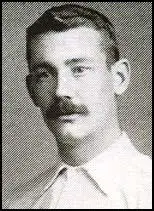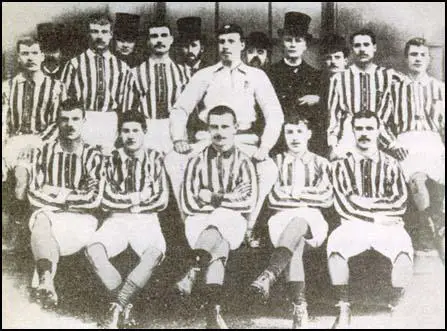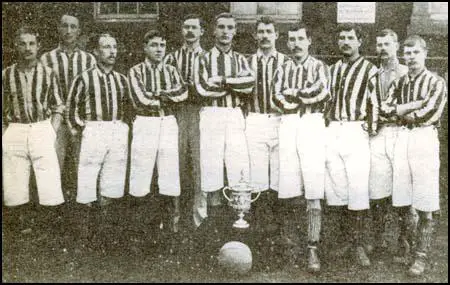Charlie Perry

Charlie Perry was born in West Bromwich on 3rd January 1866. The West Bromwich Strollers club was formed in 1879 by a group of young men from the Salter's Spring Factory. Initially they played cricket at Dartmouth Park but in 1882 they decided to form the West Bromwich Albion football club. Perry, who worked at the factory, signed for WBA in 1882. He played in the second-team for two years before making his debut for the club.
WBA entered the FA Cup in the 1883-84 season but lost in the first round to Wednesbury Town. The following year they played Aston Villa away in the 3rd round. Over 22,000 people saw WBA beat their local rivals 3-0. After beating Druids they faced the mighty Blackburn Rovers in the 5th round. A record home attendance of 16,393 saw Blackburn win 2-0.
In the 1885-86 season WBA beat Wolverhampton Wanderers (3-1), Old Carthusians (1-0), Old Westminsters (6-0) and Small Heath Alliance (4-0) to reach the final of the competition. Fred Bunn was WBA's first-team centre-half at the time. However, he got injured and Charlie Perry replaced him for the final.
WBA's opponents were Blackburn Rovers, who were appearing in their third successive final. Four of the players, Fergie Suter, Hugh McIntyre, Jimmy Brown and Jimmy Douglas were playing in their fourth final in five season. The game at the Kennington Oval ended in a 0-0 draw.
The replay took place at the Racecourse Ground, Derby. A goal by Joe Sowerbutts gave Blackburn Rovers an early lead. In the second-half James Brown collected the ball in his own area, took the ball past several WBA players, ran the length of the field and scored one of the best goals scored in a FA Cup final. Blackburn now joined the Wanderers in achieving three successive cup final victories.
This was a magnificent achievement for a team of amateurs. Seven members of the team that reached the 1886 FA Cup Final still worked at Salter's Spring Factory. This included Charlie Perry, Bob Roberts, George Woodhall, George Timmins, Ezra Horton George Bell, and Harry Bell. All eleven players were born within a six-mile radius of West Bromwich. At the time the town had a population of 56,000 people.
In the 1886-87 season WBA beat Burton Wanderers (6-0), Derby Junction (2-1), Mitchell's St George (1-0), Lockwood Brothers (2-1), Notts County (4-1), Preston North End (3-1) to reach the final against Aston Villa. For the second successive year WBA lost the final 2-0.
WBA was in great form in the 1887-88 season, scoring 195 goals in 58 first-team matches. The club also enjoyed another good run in the FA Cup beating Stoke City (4-1), Old Carthusians (4-2) and Derby Junction (3-0) to reach the final against Preston North End.
A crowd of nearly 20,000 watched the final at the Kennington Oval on 24th March, 1888. The 19-year-old Billy Bassett was the star of the game and after one long dribble he passed to Jem Bayliss who scored the opening goal. Fred Dewhurst scored an equalizer early in the second-half but WBA gradually got the upper-hand. According to Philip Gibbons in Association Football in Victorian England: "Bassett tormented their defence". He eventually provided the cross for George Woodhall to score the winning-goal ten minutes from time.

Albert Aldridge, Charlie Perry, Ezra Horton, Bob Roberts, George Timmins, Harry Green;
front row, George Woodhall, Billy Bassett, Jem Bayliss, Tom Pearson, Joe Wilson.
In his book, The Essential History of West Bromwich Albion, Gavin McOwan argues: "Charlie Perry was the heart of the defence... He was cool under pressure and a great marshal of his troops, yet despite the physical nature of the game in this time, he was never cautioned."
On 2nd March, 1888, William McGregorcirculated a letter to Aston Villa, Blackburn Rovers, Bolton Wanderers, Preston North End, and West Bromwich Albion suggesting that "ten or twelve of the most prominent clubs in England combine to arrange home and away fixtures each season." John J. Bentley of Bolton Wanderers and Tom Mitchell of Blackburn Rovers responded very positively to the suggestion. They suggested that other clubs should be invited to the meeting being held on 23rd March, 1888.
The following month the Football League was formed. It consisted of six clubs from Lancashire (Preston North End, Accrington, Blackburn Rovers, Burnley, Bolton Wanderers and Everton) and six from the Midlands (Aston Villa, Derby County, Notts County, Stoke, West Bromwich Albion and Wolverhampton Wanderers).
The first season of the Football League began in September, 1888. WBA's professional players received 10 shillings a week, with no bonuses or expenses. Preston North End won the first championship without losing a single match and acquired the name the "invincibles". West Bromwich Albion finished in 6th place with Billy Bassett ending up as the club's top scorer with 14 goals in 25 games. Second in the list was Tom Pearson who scored 12 in 26.
Preston North End also won the First Division title in the 1889-90 season. WBA finished in 5th place. Top scorer for the club that season was Tom Pearson with 17 goals in 24 games.
Charlie Perry had a good season and on 15th March, 1890, he won his first international cap playing for England against Ireland. Also in the team that day was Joseph Lofthouse, James Forrest, Fred Geary, John Barton, Billy Townley and Nathan Walton. England won the match 9-1. Perry also played in two other international games. He was a member of the England team that beat Ireland (6-1) and Wales (6-0).
In 1891 Charlie Perry replaced Jem Bayliss as captain of West Bromwich Albion. The team struggled in the Football League that season. However, they did well in the FA Cup beating Old Westminsters (3-2), Blackburn Rovers (3-1), Sheffield Wednesday (2-1), Nottingham Forest (6-2) to reach the final against Aston Villa.

Mark Nicholson, Jack Reynolds, Roddy McLeod, Joe Reader, Sammy Nicholls,
Charlie Perry, Tom Pearson, Willie Groves, Alf Geddes, Thomas McCulloch.
In his book, Association Football in Victorian England, Philip Gibbons argues that: "Villa dominated the early proceedings, with Athersmith and John Devey exerting pressure on the Albion fullbacks. However, the West Bromwich side soon responded as Billy Bassett passed to Roddy McLeod, who crossed the ball to the waiting Geddes. He shot towards the Villa goal and Warner failed to collect the ball clearly. It rolled between the Villa goalposts to secure a surprising one-goal lead for the Albion team."
Billy Bassett was also involved in WBA's second goal. He won the ball on the halfway line and after running at the Aston Villa defence he passed to Alf Geddes. His shot was saved but the goalkeeper could not hold onto the ball and Sammy Nicholls had the simple task of scoring from the rebound. Jack Reynolds scored the third with a shot from 25-yards.
Over the next few years WBA had only moderate success in the Football League: 1892-93 (8th), 1893-94 (8th) and 1894-95 (13th). After beating Small Heath (2-1), Sheffield United (2-1), Wolverhampton Wanderers (1-0) they played Sheffield Wednesday in the semi-final. WBA won 2-0 but Charlie Perry suffered a serious injury and missed the final against Aston Villa. WBA lost the final 1-0.
Perry never recovered from his injury and was forced to retire from football in 1896. Playing at centre-half he had scored 16 goals in 219 games for West Bromwich Albion. He was also director of the club (1898-1902).
Charlie Perry died in 1927.
